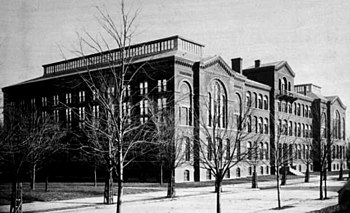|
Army Medical School The Army Medical School (AMS) was founded by U.S. Army Brigadier General George Miller Sternberg. According to some, it was the world's first school of public health and preventive medicine. (The other institution vying for this distinction is the Johns Hopkins School of Public Health (1916).) The AMS ultimately became the Army Medical Center (1923), then the Walter Reed Army Institute of Research (1953).[citation needed] HistorySternberg created the Army Medical School by issuing "General Order 51" on June 24, 1893. The School was housed, along with the Army Medical Library in the building of the Army Medical Museum and Library (affectionately known as the "Old Pickle Factory" or "Old Red") at 7th Street and South B Street (now Independence Avenue), SW, Washington, D.C. (This site is on the National Mall where the Smithsonian's Hirshhorn Museum now stands.) In 1910, the AMS relocated to 721 13th Street, NW and in 1916 to 604 Louisiana Avenue. In 1923, the "Army Medical Center" (AMC) was created when (1) the AMS became the "Medical Department Professional Service School" (MDPSS) and (2) the MDPSS moved into "Building #40" on the grounds of the Walter Reed General Hospital (WRGH) in northern Washington, D.C. The historic edifice known as Building #40 was constructed at 14th and Dahlia Streets beginning in 1922 and reached completion in 1932. This facility consists of four "Pavilions":
In 1947, the MDPSS became the "Army Medical Department Research and Graduate School" (AMDRGS), which in turn became the "Army Medical Service Graduate School" (AMSGS) in 1950. In September 1951, "General Order Number 8" combined the WRGH & AMC into the present-day Walter Reed Army Medical Center (WRAMC). Three years later, the research elements of this facility became the present-day Walter Reed Army Institute of Research (WRAIR). List of presidents and commandants
See alsoBuildingsNotable people associated with the AMS and AMCGraduates:
Others:
References
|
|||||||||||||||||||||||||||||||||||||||||||||||||||||||||||||||||||||||||||||